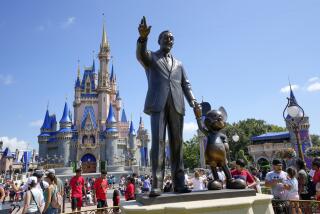The Big Fish in the Pond
- Share via
ANAHEIM — As this concerns the world of Disney, it must begin with a long, slow-moving line. Any parent who ever has taken a child to Disneyland will understand. The Disney people are without peer when it comes to putting people in line for hours. The typical wait for a Disneyland ride makes the infamous Moscow bread lines seem by comparison like the drive-through window at a well-run McDonald’s.
And so it was that the line of Disney stockholders waiting to file into the company’s annual meeting stretched almost halfway around the ice hockey arena, a facility known as the “Pond.” Progress was slow. One elderly woman could be seen creeping forward, inch by inch, on a walker; the temptation was to tell her to slow down and show some patience. For a sometimes visitor to Disneyland, it was reassuring to witness firsthand that Disney treats its owners, the shareholders, exactly like the paying stiffs.
Of such egalitarian instincts are mighty institutions made, which was exactly the point many stockholders had come to make. Typical Disney shareholder meetings are described as “lovefests,” gooey testimonials to Walt and Mickey. This one promised an edge. This one had subtext. This was to be about Eisner, or “Michael,” as even his critics insisted on calling him. There were shareholders troubled by a compensation package that could pay Eisner, again, in the hundreds of millions. There were critics of the buyout of Michael Ovitz, Eisner’s former No. 2. And there were those appalled by the gap between the executive riches and the literal pennies paid Haitian workers to churn out lovely Lion King and Dalmatian T-shirts.
“The Dalmatians,” suggested one of many picket signs waved outside the arena, “ate better than the Haitians.”
*
A few days earlier, a proponent of shareholder propositions to rein in executive windfalls and Third World sweatshops described how the meeting would go. “Our proposals will come at the beginning,” said Tom Van Dyke, co-founder of Progressive Asset Management. At the time, he was polishing a speech that compared the Disney saga to the “Lion King” story. Eisner was Simba, and Van Dyke would urge him to return from exile and restore order. Unfortunately for Van Dyke, the meeting did not unfold quite as expected.
When his time came Tuesday, the activist delivered his speech well. Its force, however, was diminished by the fact that hardly anybody was left to hear it. The bulk of the 12,000 in attendance already had left. Before the meeting there had been speculation about how Eisner would handle his critics. The answer was this: He talked them into submission.
The CEO was introduced by Mickey Mouse. Eisner started talking. He talked about the Disney directors. He talked about corporate growth and new kingdoms to conquer, about cruise lines and theme parks and Disney stores. He talked about Disney-owned television networks. Peter Jennings was trotted out via satellite to give a howdy to the crowd; said he was having a tough day on the news front. Eisner talked of past and future blockbuster movies, and planned communities in Florida, and new amusements at Disneyland, and on and on and on.
He recited numbers, and more numbers. The figures were fantastic. He described “a company whose market capitalization has grown from 2 billion dollars to 50 billion, 876 million, 146 thousand, 646 dollars and 88 cents--just to make a point.” When Eisner wore down, he brought out underlings to issue similar reports from various corners of the kingdom. All were, to put it mildly, upbeat. And thorough.
*
The filibuster lasted beyond two hours, a long time for a shareholder meeting--an even longer time to be lectured about Disney wonders. Put another way, if Eisner and Co. had been Haitian garment workers, they would have earned for their time on the dais something like 60 cents apiece! Next were the votes on shareholder agenda items. Disney prevailed on each, although the sweatshop activists did win enough support to allow for a reopening of their issues next year.
And at last--four hours into the meeting--came what was supposed to have been the main attraction. Eisner retook the stage to field questions. A few hands went up, which is to say everybody left had something to ask. Some were quite spirited. He was asked to justify his pay, the Ovitz fiasco, Haitian wage levels, risque movie content, the absence of restrooms during the wait in line and even why the arena was so cold. “. . . Because we want the meeting to end,” he said to this last inquiry.
The final question was hollered out by a fellow frustrated because the microphones were turned off. “Do you need a bonus,” he shouted through cupped hands, “for 15 more minutes of questions and answers?” Eisner thought about this and then smiled, thinly. “Actually,” he said, “I do.” And with that, he strolled off the stage.
More to Read
Inside the business of entertainment
The Wide Shot brings you news, analysis and insights on everything from streaming wars to production — and what it all means for the future.
You may occasionally receive promotional content from the Los Angeles Times.











